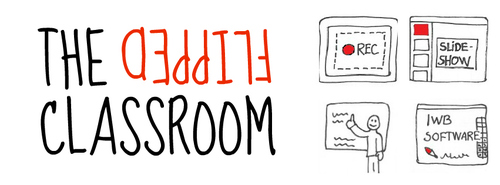Writing in The Kernel on 23rd August last, Jonathan Rees asks many questions about one of the latest trends in third-level education - his article is entitled: The ‘flipped classroom’ is professional suicide*. Clearly no fan of this trend, Rees wonders about "pedagogical problems" such as how his students "would find time to do their assigned reading if they were watching class videos in their dorm rooms three times a week" and what would his other students "be doing while I [he] personally interacted with other students". Later in the articles he raises questions about "copyright issues" and "competition" with the Internet.
 |
| Image Source: Wikimedia Commons. |
There is an interesting (unattributed) quote in Rees' article:
“Why should you lecture, when you can get some hotshot from Harvard to do your job for you?”
This is a hard one to agree or disagree with. As a learner I definitely would prefer an on-line lecture on a subject from a Professor at Harvard who has written books on the subject and has been teaching it at Harvard for many years, compared to an inexperienced part-time lecturer who has never taught the subject before. While lecturers, especially younger ones, must start somewhere (we all remember that first time we taught a module) the temptation to go for the Harvard professor as a learner is huge. When College management are deciding who teaches what, some subjects are inevitably given to new and inexperienced lecturers (who in time may become great teachers and experts in their field). When it comes to exams, the Harvard professor does not set these and there is the dilemma for students on which set of lecture notes/podcasts to study in preparation for exams (the good stuff from Harvard, or the class notes on which the exam will be based).
In 2010 I started (and completed) the free Harvard University course on "Justice" by Professor Michael Sandel. There were 12 lectures in this course and I enjoyed every single one of them. In short, this was the best on-line class I have ever "attended" - it would be hard to get a better set of lectures than this. So - what about this for a dilemma? What if your College had a module on "Justice" in one of its courses? As Professor Sandel himself might ask - what would the right thing to do be? Should Sandel (the best) be on the module timetable? Could/should he (or Harvard) be paid for this? If a new lecturer is assigned, should they create their own material or use Sandel's (I use his train wreck story from lecture #1 in my class)? Should Sandel's course be on the module Reading List (or video/podcast equivalent)?
As a leaner I know which I'd go for, but as a Lecturer the decision is more difficult. I don't want to be a turkey voting for Chistmas, and talk myself out of a job - but I do see more more flipping happening in the future. If a course has several flipped modules, it would be easy to trawl the finest Universities for on-line content and say to students - "Watch this video and we'll discuss it in the next tutorial". This would save a lot of money. The temptation for Colleges/Schools to do this will become more and more real. The availability of top class content combined with tight or decreasing budgets will (I believe) force Colleges to rethink how they allocate teaching duties. When you think about it - what is wrong with creating a full degree programme with modules taught by experts from Harvard, MIT, Oxbridge, or any of the top-class Colleges around the world? Expensive Lecturers would no longer be needed! Learners would get the best education available and Colleges would save a lot of money that could be put to other use (such as research).
I just hope this doesn't happen before I retire in 10 years time!
 |
| Image source: Philip Holt. |
I just hope this doesn't happen before I retire in 10 years time!
* The ‘flipped classroom’ is professional suicide
By Jonathan Rees on August 23rd, 2015
Available at: http://kernelmag.dailydot.com/issue-sections/staff-editorials/14089/flipped-classroom-professors-unbundled-to-death
Not sure I would worry too much about this. Flipped classrooms require a fundamental change in student mindset if they are to work and I don't see Irish students buying in to the concept in the foreseeable future.
ReplyDeleteHi Greg,
ReplyDeleteMany thanks for the comment.
I agree that students may take a long time to buy into this "concept", perhaps even longer for Lecturers!
E.